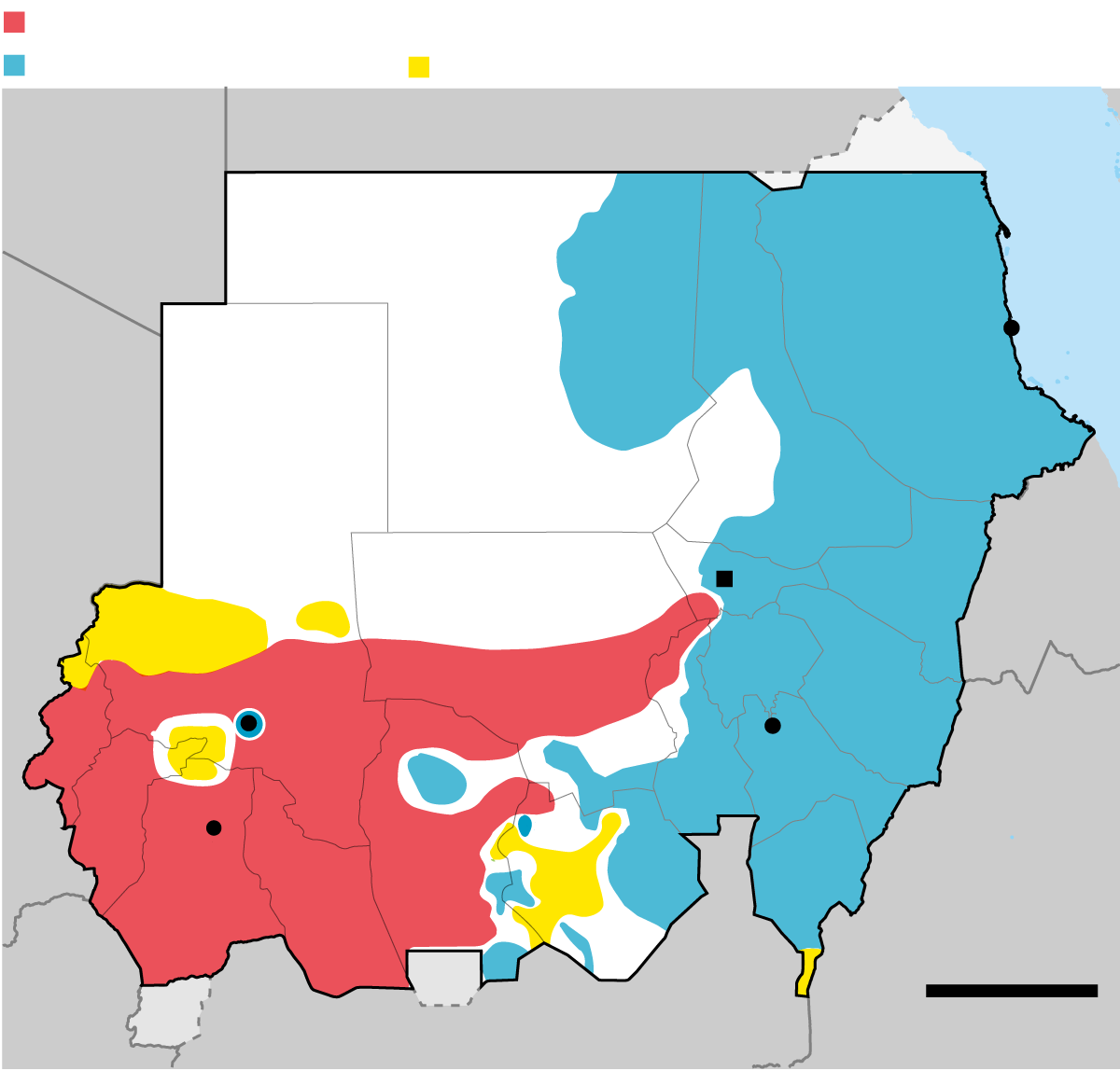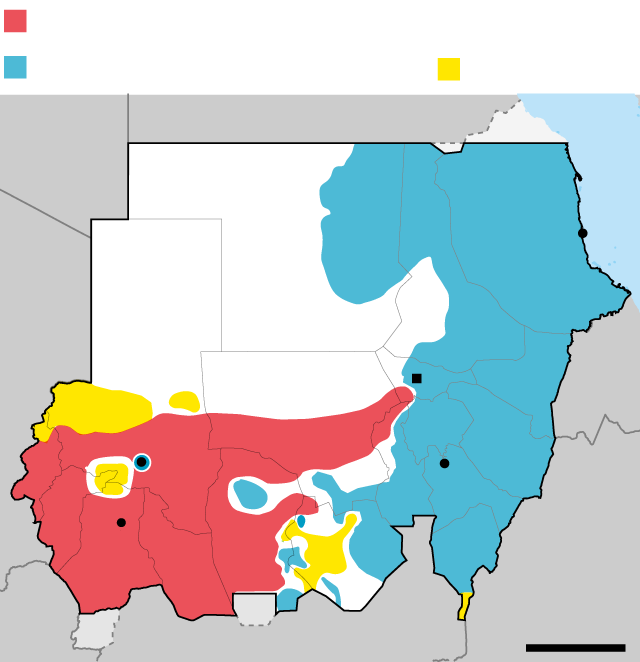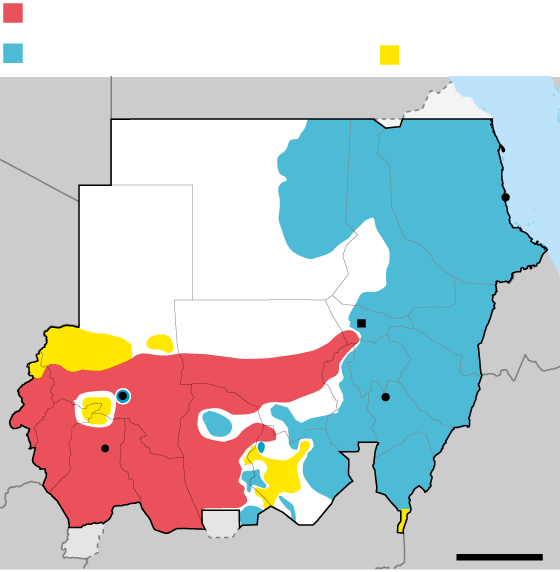Two years into the war that has turned Sudan into the country with the largest humanitarian crisis in the world
A massacre of hundreds of people in Darfur displacement camps has cast a shadow over prospects for peace.


BarcelonaOn April 15, 2023, violence erupted in Khartoum and other cities in Sudan, which this Tuesday entered its third year of civil war with extremely remote prospects for peace in the short or medium term. Furthermore, the latest information coming from Darfur, in the west of the country, increases pessimism even further. Hundreds of people—more than 350 according to the regional government—have died since last Thursday, when the Rapid Support Forces (RSF) stormed two displaced persons camps near the town of Al Fashir with great violence.
This town has been under siege for almost a year by the RSF and is currently the main focus of fighting between the paramilitary group and the regular army, who have been at odds for two years. Both sides remain entrenched in their struggle for power and have so far failed any attempt at mediation.
Since Sudanese armed forces regained control of Khartoum, the capital, in late March.The SRF has stepped up operations against military strongholds in Darfur. Al-Fashir, the capital of North Darfur, is the army's last stronghold in western Sudan. Regular forces have launched a large-scale campaign to consolidate their hold on this town and recapture other areas of Darfur, a region devastated twenty years ago in a bloody civil war.
This Sunday, the armed forces admitted that the SRF has taken control of the Zamzam displaced persons camp, the largest in the Darfur region, after three days of fierce fighting and drone and artillery bombardments. The militants have also killed dozens of people at the Abu Shok camp. The two camps together host more than 700,000 people who have fled the violence of recent years.
The origins of the violence
Sudan has gone from being the region's democratic hope to sinking into what the United Nations and numerous NGOs have described as the world's largest humanitarian crisis.
In 2019, after eight months of protests, Omar al-Bashir's regime fell in a coup d'état with the promise of a democratic transition. The military held power for two years and then ceded it to a civilian government, but the army commander himself, Abdel Fattah al-Buhran, buried it with a new coup in 2021. The other architect of the uprising was Mohamed Hamdan Dagalo (known as Hemedti). They were allies at the time, but the lack of an agreement to integrate the militia into the regular army led to open fighting. For the past two years, al-Buhran and Hemedti have led the two sides that have plunged Sudan back into civil war.
Since then, more than 14 million people, or 30% of the country's population, have been forced to flee their homes. The majority, some 11 million, have moved to other parts of the country, while the rest have crossed international borders, adding pressure to neighboring countries already experiencing their own crises, such as South Sudan, Ethiopia, and Chad. The death toll is unclear, but the latest estimates from humanitarian organizations put the number at around 150,000 in the past two years.
The world's worst hunger crisis
The United Nations continues to call for more support, as more than 30 million people—two out of every three of the country's inhabitants—need humanitarian aid and the country is experiencing "the most serious hunger crisis in the world." Furthermore, the risk of epidemic outbreaks of cholera, dengue, measles, diphtheria, and malaria is growing.
In these two years, numerous human rights violations have been reported, such as systematic sexual violence and mass executions. Human Rights Watch (HRW) denounced in a statement on Monday that both the Rapid Support Forces and the army have committed "widespread abuses, including extrajudicial killings, sexual violence, rampant looting, and destruction of civilian infrastructure."
And the outlook for the future is devastating. "As the fighting in Sudan enters its third year with no peace in sight, the Sudanese are trapped in a humanitarian crisis of industrial proportions," warned Jens Laerke, spokesperson for the UN Office for the Coordination of Humanitarian Affairs, on Friday. "The war in Sudan is entering its third year, and the population remains in hiding, bombed, besieged, displaced, and deprived of food, medical care, and basic services," Médecins Sans Frontières (MSF) summarized on Monday.
International alliances
Aside from the lack of will on both sides, the conflict is also fueled by external interests, which do not help move toward de-escalation. The Sudanese army receives support from several Arab countries, especially Egypt and Saudi Arabia, while the United Arab Emirates is the main sponsor of the SRF. Cameron Hudson, an analyst at the Center for Strategic and International Studies (CSIS), explained: in an analysis when the army resumed control of Khartoum that the advance was due, in part, to the fact that the regular forces have obtained highly effective drones from Turkey and fighter jets and other heavy weapons from China and Russia.
According to the International Crisis Group, both sides are receiving "substantial" military supplies, such as new drones. "In addition, Arab and African countries are competing to project power through Sudan, which lies on the strategic Red Sea, and they consider the outcome of the war to be a great risk," it adds in a recent article. He think tank He believes that Saudi Arabia could pressure Al Buhran to move toward peace: "It could offer funds for the reconstruction of Khartoum and other devastated areas, making them conditional on negotiating a ceasefire."
However, he believes that the position of the two opposing sides makes this difficult. "Instead of using their advance to seek peace, the army seems to want to push for total victory, while the SRF seeks to expand the war to new areas," he summarizes. He indicates that the SRF has allied itself with another militia, the Sudan People's Liberation Movement-North (SPLM-North), and since February has launched joint offensives in areas bordering South Sudan and Ethiopia, which means that instead of ending the war, it is expanding.
This Tuesday, coinciding with the second anniversary, the British government will bring together the foreign ministers of around twenty countries and representatives of various organizations in London for a conference to intensify diplomatic pressure and demand a ceasefire.



